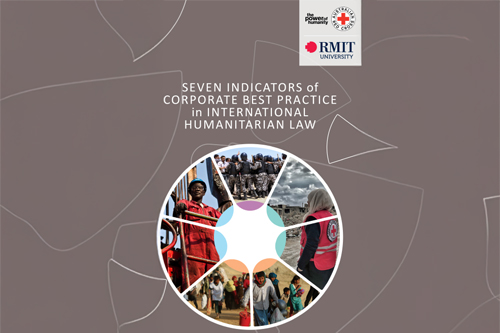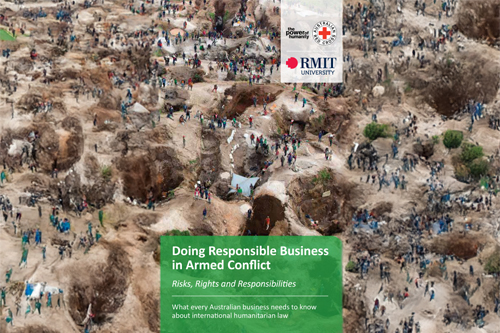

Like all Red Cross and Red Crescent National Societies around the world, Australian Red Cross has a duty to disseminate international humanitarian law, also known as the laws of war, and improve understanding and respect for these laws.
We are actively seeking ways to assist Australian organisations to understand IHL and embed it appropriately in their policies and operations.
We want to engage with all Australian organisations with operations in conflict affected areas, and look forward to providing new resources to help businesses adopt and demonstrate best practice.
Contact us for more information: lawsofwar@redcross.org.au
Try our immersive learning experience for future business leaders.
Doing responsible business in armed conflict: what every Australian business needs to know about international humanitarian law.

Australian Red Cross and RMIT University have developed seven indicators of corporate best practice in international humanitarian law as a guide for the corporate sector. These indicators aim to assist businesses in enhancing their human rights due diligence by effectively integrating IHL into companies’ existing business and human rights frameworks.

This publication aims to assist Australian businesses in understanding their risks, rights and responsibilities under international humanitarian law. It has been specifically designed to provide an overview for managers and executives, and supplements existing human rights-oriented guidance documents.
Australian companies are increasingly exposed to conflict-affected areas, primarily due to the proximity of business operations to war zones and the propensity to hire private security forces when operating in insecure environments. Such exposure gives rise to heightened operational, ethical and reputational risks to business personnel, assets and ‘corporate brand’.
Companies, as well as individual corporate executives and employees, are also exposed to domestic and international legal liabilities when conducting business activities in a conflict-affected area. These include the possibility of criminal responsibility for the commission of, or complicity in, war-crimes and civil liability for damages. Such legal actions have been launched in multiple jurisdictions around the world.
Despite this, our research indicates that Australian companies remain largely unfamiliar with international humanitarian law and its relevance to their operations.
International humanitarian law, found primarily in the 1949 Geneva Conventions, is relevant to any actor exposed to armed conflict. This body of law exists, in part, to protect civilians and civilian property – including company personnel, assets and operations – in situations of armed conflict.
Businesses are increasingly demonstrating their commitment to conduct activities in a conflict-sensitive manner, with an awareness of human rights obligations and the Sustainable Development Goals. There is also growing global acknowledgment of both the positive and negative impacts that businesses can have on armed conflict and other situations of violence. For instance, there are examples of businesses playing significant social, political and economic roles in conflict situations, such as providing valuable services to civilian populations in times of war, but also evidence of businesses being complicit in atrocities amounting to war crimes and crimes against humanity. However, we believe international humanitarian law remains underrepresented in contemporary discussions on corporate social responsibility and sustainability.
Red Cross pays our respects to the Aboriginal and Torres Strait Islander custodians of the country where we work, and to Elders, past, present and emerging.
Learn about our Reconciliation Action Plan and how we can all make reconciliation real.
This website may contain the images, voices or names of people who have passed away.


© Australian Red Cross 2026. ABN 50 169 561 394
